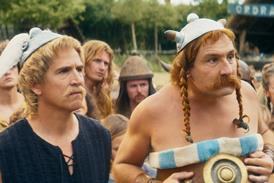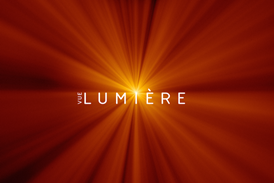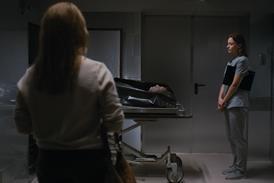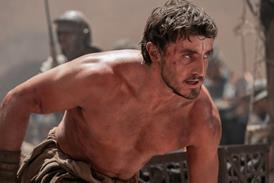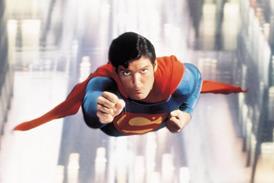Two-time Palme D’Or winner Michael Haneke returns with a close-quarters family drama
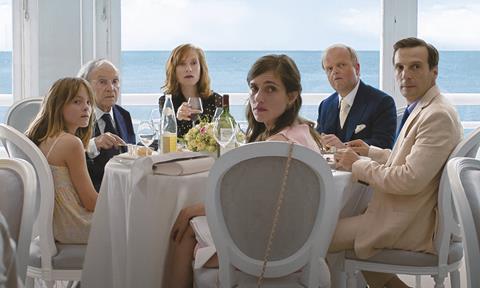
Dir/scr Michael Haneke. France, Germany, Austria, 2017. 107 mins.
Austrian director Michael Haneke’s first film since his 2012 Palme d’Or and 2013 Oscar winner Amour, Happy End is a sombre, austere work whose formal rigour is, unusually for the director, not quite matched by its thematic resonance. Charting the life of a wealthy family in the northern French town of Calais as cracks in their silver-service façade appear and widen, it plays in some ways like a throwback to the bourgeois ennui genre cornered in the 1960s by directors such as Antonioni.
Happy End feels like an assemblage of Haneke’s favourite themes
Haneke’s magisterial control of tone, actor and shot is not to be underestimated: there are scenes of quiet, nuanced authority and menace here that, true to form, compel our attention with their glacial brilliance. (Some of the best are associated with the family patriarch played by 86-year-old Jean-Louis Trintignant, who five years after Amour and 61 since And God Created Woman has lost none of his ability to command a dark room).
But Happy End feels like an assemblage of Haneke’s favourite themes, a spread of nibbles that lays out video surveillance and reticent camera long-shots (Hidden), creepy angel-faced kids (The White Ribbon), euthanasia (Amour), women who get it on by being sexually humiliated (The Piano Teacher) and closed bourgeois societies threatened by outsiders (Time of the Wolf, among others). Yet it never amounts to a full meal.
Ultimately, this will count as an interlocutory title in the director’s impressive filmography. In the short term, that will likely translate into a dip in the audience for a film which had already been pre-sold to a raft of distributors worldwide by late 2016, including Sony Pictures Classics for the US and Latin American.
Shot mostly in the northern French coastal towns of Douai, Calais and Dunkirk, the film opens with smartphone video footage, spliced into the credits, that immediately paint a disturbing picture of a messed-up kid with access to anti-depressants and a guinea pig to try them out on. She turns out to be sad-eyed Eve Laurent, an almost-13-year-old who is taken in by the family of her father Thomas – a nicely subdued Mathieu Kassovitz – when her mum is admitted to hospital after what looks, to the doctors, like a deliberate overdose of barbiturates.
In the early stages of dementia, Eve’s 85-year-old grandfather Georges (Trintignant) has handed over the running of the family construction firm to his steely daughter Anne (Isabelle Huppert), engaged to a London financier played by Toby Jones. Also living in the Laurent family’s old-money townhouse are the philandering Thomas’ downtrodden second wife, Anaïs and their new baby son; and Pierre (Franz Rogowski), Anne’s depressed son, whose uselessness seems mostly a protest against a business he detests and the assumption that he will one day take it over. Tending to the family’s needs are a Maghrebi couple who live in: caretaker Rachid (Hassam Ghancy) and his wife Jamila (Nabiha Akkari), who cooks for the Laurents.
In the fall-out from a tragedy that takes place on a Laurent building site, Happy End ventures into Hidden territory as the guilt-ridden Pierre is beaten up when attempting, we assume (it’s another of those difficult-to-read Haneke long-shots), to make amends to the dead man’s family. But in this choral Laurent family saga with its multiple viewpoints, individual stories have little time or inclination to flourish. It’s the mosaic of desperation and disintegration that interests Haneke: Anne’s reduction of affective life to damage management; Thomas’ self-deception; Pierre’s self-hatred; George’s desire for self-annihilation; and the dramatic pulse that keeps switching Eve between little-girl vulnerability and cold, pre-meditated damage.
Is all of this a metaphor for Europe’s moral paralysis vis a vis the refugee crisis, one chapter of which played out until recently in the notorious ‘Jungle’ shanty town a few short miles from the Laurent’s home? A final scene might suggest as much – or might not. Eve’s dark smartphone videos and cyber-spying on her dad might suggest visions of a younger generation lost to sadism-tinged anomie; or they might just be something that comes naturally to an affection-deprived, mixed-up kid. For once, Haneke’s famous narrative reticence feels frustrating rather than rewarding, as if he’s trying to have his Sacher Torte and eat it.
Production companies: Les Films du Losange, X Filme Creative Pool, Wega Film
International sales: Les Films du Losange, b.vincent@filmsdulosange.fr
Producers: Margaret Menegoz, Stefan A
Executive producers: Margaret Menegoz, Uwe Schott, Michael Katz
Cinematography: Christian Berger
Production design: Olivier Randot
Editor: Monika Willi
Main cast: Isabelle Huppert, Jean-Louis Trintignant, Matthieu Kassovitz, Fantine Harduin, Franz Rogowski, Laura Verlinden, Toby Jones, Hassam Ghancy, Nabiha Akkari




